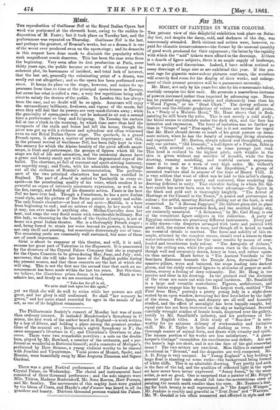THE reproduction of -Guillaume Teti at the Royal Italian Opera
last week was postponed at the dleventh hour, owing to the sudden in- disposition of M. Fatere; bat it took place on Tuesdaylast, and the performance was repeated on Thursday. Guillaume Tell is the last, and perhaps the-greatest, of Rossini's works, but as a drama it is one of the worst ever produced even on the opera-stage; and its demerits in this reaped have done -much to diminish the popularity which such magnificent music deserves. 'This has -been the case even from the beginning Very soon after its first production at Paris, some thirty years ago, the public became so -weary of its clumsy and in- coherent plot, its barrenness of incident, and total lack of interest, that the last act, generally lie culminating point of a drama, was coolly cut out altogether; and 20 the opera has been performed ever since. It -keeps its place on the stage, however, and makes its ap- pearance from time to -time at the principal opera-houses in Europe, but never has what is called-a run; a 'very few repetitions being suffi- cient-to satisfy the desires ofthe-public. In London this has always been the case, and no doubt will be so again. Amateurs will enjoy the extraordinary brilliancy, freshness, and vigour of the music, hut even they will feel that its powers are very much thrown away; while the generality of opera4vers will not be ind.wiedio sit out a second time a performance so long and fatiguing. On Tuesday the curtain fell at one o'clock in the morning, by whirl time more than half the occupants of the stalls and boxes had left the house, though the piece was got up with a richness and splendour mot often witnessed even on our Royal Italian Opera stage. importance; The spectacle, in a grand French opera, is always a matter-of primary and this, in the present revival of -Prailkrame Tell, has been fully -kept in view. The scenery for which the Alpine locality of the piece affords ample scope, is fresh and picturesque, the groups of figures which fill the stage are full of life and animation, and the incidental dances have a ,,orace and beauty rarely met with in these degenerated days of the ballet. The choruses, so full of resonant and spirit-stirring harmony, are superbly sung and Costa, with his admirable orchestra, brings out all the tidiness of Ros.shirs instrumentation. The perform- ance of -the two principal characters has not 'been excelled in England. The part of Arnold suited to Tamberlik in everyte- spect—in the penetrating quality of his voice, which renders it so powerful an organ of intensely passionate expression, as well as in the fire, energy, mid feeling of his dramatic action. Faure is the best Tell we have ever had. 'Though a Frenchman, he has a pure Italian vocal style, and his picture of the Swiss patriot is manly and noble. The only female character—at least of any note—Matilda, is a bore from beginning to end ; and no actress or singer, be her merit what it-may, can ever make it- anything else. Miolan-Carvalhe does her best, and sings the very florid music with considerable brilliancy. But this lady, so charming on the boards of the Opera-Comique, is not at home in a great Italian theatre. She is a thoroughly French singer ; and, being forced to strain her voice beyond its powers, it becomes not only shrill and piercing, but sometimes distressingly out of tune. The remaining parts are reasonably well sustained, but none of them are of much importance. ,Grisi is about to reappear at this theatre, and will, it is said, aesume her great part of Valentine in the Huguenots. it is announced iby the directors of the Crystal Palace Company that she is engaged for the Opera Concerts to be given during May, June, and July; and, moreover, that she will take her leave of the English public daring thc -present season, and that these concerts are the last at which she will sing. This is not the first nor the second time that such an an- nouncement has been made within the last ten years. But this time, we believe, the illustrious prima donna is in earnest. Much as we admire her, -and firmly es we are convinced that,
" Takeler for-all in all, We ne'er shall look upon her like again,"
yet we think she will do well to retire while her powers are still great, and her glory is still undimmed. So shall "her memory be green," and her name stand recorded for ages in the annals of her art, as one of its brightest ornaments.






























 Previous page
Previous page